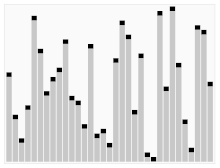
Back ترتيب سريع Arabic Sürətli nizamlama (Quicksort) Azerbaijani Бързо сортиране Bulgarian কুইক সর্ট Bengali/Bangla Quicksort Catalan Rychlé řazení Czech Quicksort German Γρήγορη ταξινόμηση Greek Rapida ordigo Esperanto Quicksort Spanish
 Animated visualization of the quicksort algorithm. The horizontal lines are pivot values. | |
| Class | Sorting algorithm |
|---|---|
| Worst-case performance | |
| Best-case performance | (simple partition) or (three-way partition and equal keys) |
| Average performance | |
| Worst-case space complexity | auxiliary (naive) auxiliary (Hoare 1962) |
| Optimal | No |
Quicksort is an efficient, general-purpose sorting algorithm. Quicksort was developed by British computer scientist Tony Hoare in 1959[1] and published in 1961.[2] It is still a commonly used algorithm for sorting. Overall, it is slightly faster than merge sort and heapsort for randomized data, particularly on larger distributions.[3]
Quicksort is a divide-and-conquer algorithm. It works by selecting a 'pivot' element from the array and partitioning the other elements into two sub-arrays, according to whether they are less than or greater than the pivot. For this reason, it is sometimes called partition-exchange sort.[4] The sub-arrays are then sorted recursively. This can be done in-place, requiring small additional amounts of memory to perform the sorting.
Quicksort is a comparison sort, meaning that it can sort items of any type for which a "less-than" relation (formally, a total order) is defined. It is a comparison-based sort since elements a and b are only swapped in case their relative order has been obtained in the transitive closure of prior comparison-outcomes. Most implementations of quicksort are not stable, meaning that the relative order of equal sort items is not preserved.
Mathematical analysis of quicksort shows that, on average, the algorithm takes comparisons to sort n items. In the worst case, it makes comparisons.
- ^ "Sir Antony Hoare". Computer History Museum. Archived from the original on 3 April 2015. Retrieved 22 April 2015.
- ^ Hoare, C. A. R. (1961). "Algorithm 64: Quicksort". Comm. ACM. 4 (7): 321. doi:10.1145/366622.366644.
- ^ Skiena, Steven S. (2008). The Algorithm Design Manual. Springer. p. 129. ISBN 978-1-84800-069-8.
- ^ C.L. Foster, Algorithms, Abstraction and Implementation, 1992, ISBN 0122626605, p. 98
© MMXXIII Rich X Search. We shall prevail. All rights reserved. Rich X Search




